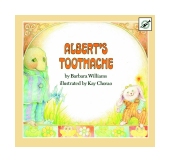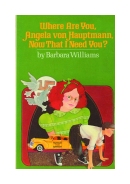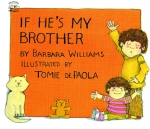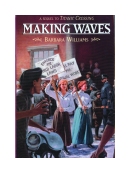
VOL. 10 NO. 3 THE MAGAZINE OF THE UNIVERSITY OF UTAH WINTER 2000
Continuum
Home Page - University of Utah Home
Page - Alumni Association
Home Page
Table of Contents
"I was inspired as a very young child to be a writer because I couldn't do anything else," says Barbara (Bea) Wright Williams BS'46 MA'72.
 |
|
Alumna
Bea Williams
has produced a bundle of children's books —and a bevy of devoted bookworms. By Nettie Bagley |
The author of such children's books as Titanic Crossing and Beheaded, Survived, Williams is today a standout in the competitive world of children's literature.
"My inspiration in those early days was Olive Woolley Burt," Williams says. Williams was one of Burt's Salt Lake Tribune "School News and Views" classroom reporters from kindergarten through 7th grade-except for one year when her best friend led an insurrection, declaring that "Barbara Wright has been classroom reporter every year, and I think it's someone else's turn."
When she was 11 and 12 years old, Williams contributed to Burt's Tribune Junior feature, where students could submit stories other than school news. Her first paycheck of $1.50 arrived when one of her stories was printed in the regular Tribune. Her quandary was whether to save the check or spend it. Her father came to the rescue, persuading the Tribune treasurer to return the check to Williams after it had been cashed. "It's still in my scrapbook," she laughs.
 As
an English major at the U, Williams had a dream of writing the great American
novel. "I didn't do very well writing that novel," she says,
"and I didn't do very well writing short stories. I couldn't get
anything published." Since her first desire as a child was to become
an actress, she turned to playwriting. Of the first four plays she wrote,
three were published and one was a contest winner. Then, when her children
were born, she read to them-at naptime and at bedtime. "And I thought,
'Gee, children's books are fun. I'd like to write one of these.'"
The rest is history. "It took a long time to get one published,"
she reveals, "and it takes a long time with each one-I've submitted
some of them as many as 39 times to various publishers before they were
accepted." When her husband, Professor Emeritus J.D. Williams, tells
people his wife is working on her 52nd book, she quips, "No, I'm
not. I'm working on my 7,000th book." She has an unpublished treasury.
As
an English major at the U, Williams had a dream of writing the great American
novel. "I didn't do very well writing that novel," she says,
"and I didn't do very well writing short stories. I couldn't get
anything published." Since her first desire as a child was to become
an actress, she turned to playwriting. Of the first four plays she wrote,
three were published and one was a contest winner. Then, when her children
were born, she read to them-at naptime and at bedtime. "And I thought,
'Gee, children's books are fun. I'd like to write one of these.'"
The rest is history. "It took a long time to get one published,"
she reveals, "and it takes a long time with each one-I've submitted
some of them as many as 39 times to various publishers before they were
accepted." When her husband, Professor Emeritus J.D. Williams, tells
people his wife is working on her 52nd book, she quips, "No, I'm
not. I'm working on my 7,000th book." She has an unpublished treasury.
 Williams
says her favorite book is always the last one to have been published,
and she has a strong superstition that prevents her from saying anything
about the book on which she is currently working: "I don't talk about
it until it's published." But she will speak of what a thrill it
was to have book number 49, Titanic Crossing, on the best-seller
list. That book garnered the Mark Twain Award from the state of Missouri,
and three other states' awards. She prizes most the Twain Award and the
Christopher Award, which she won for a picture book, Chester Chipmunk's
Thanksgiving.
Williams
says her favorite book is always the last one to have been published,
and she has a strong superstition that prevents her from saying anything
about the book on which she is currently working: "I don't talk about
it until it's published." But she will speak of what a thrill it
was to have book number 49, Titanic Crossing, on the best-seller
list. That book garnered the Mark Twain Award from the state of Missouri,
and three other states' awards. She prizes most the Twain Award and the
Christopher Award, which she won for a picture book, Chester Chipmunk's
Thanksgiving.
Although she never achieved her dream of being a professional actress, Williams did diversify and become a teacher in the English department at the U. Jack Adamson, department chair, asked her to teach remedial English to those students who were unable to gain admittance to the University due to low scores in English. Two weeks into that new career, she received word that a baby girl was immediately available for adoption. With three sons at home, the Williamses jumped at the opportunity to welcome a daughter into the family. At night Williams would study, a book in one hand, a bottle in the other, "feeding the adorable little baby who lay on my lap. It was a wonderful time of my life," she says.
 Because
no remedial composition textbooks were available at that time, Williams
accepted the challenge to write a manual that could be mimeographed and
sold to students for five cents above cost-the amount she would receive
as payment for her efforts. That manuscript was picked up by a publishing
company, and the result was the publication of her first English textbook.
A second textbook was requested two years later. These two books, with
various revisions, remained in use for 20 years.
Because
no remedial composition textbooks were available at that time, Williams
accepted the challenge to write a manual that could be mimeographed and
sold to students for five cents above cost-the amount she would receive
as payment for her efforts. That manuscript was picked up by a publishing
company, and the result was the publication of her first English textbook.
A second textbook was requested two years later. These two books, with
various revisions, remained in use for 20 years.
During the 12 years she taught at the U, Williams also earned her master's degree. She then taught a summer course in writing for children through the English department, and after one quarter there, the education department hired her to teach a class in children's writing-which became an eight-year stint. Her next teaching move was to her home, where, for about 10 years she held classes on writing children's books.
One of Williams' office mates in the English department was Emma Lou Thayne BA'45 MA'70, with whom she has been friends since high school. "We became friends by writing poems to each other that were fun and silly," says Thayne. "For example, I wrote one to her called 'Beawatha,' to the cadence of Longfellow's 'Hiawatha.'"
 Thayne
recalls that in 1952 Williams recruited eight women for a writing group
that met every other Tuesday. "She made rules for our group,"
Thayne says, "two of which were that we had to wear pants when we
wrote and we could eat nothing but that which came from a can or a bottle."
She adds, "We read each other's manuscripts, and the critiquing was
invaluable. A few years ago the group got together again and determined
that among these eight women there were 92 publications. I respect her
as much as anybody on this globe," Thayne declares.
Thayne
recalls that in 1952 Williams recruited eight women for a writing group
that met every other Tuesday. "She made rules for our group,"
Thayne says, "two of which were that we had to wear pants when we
wrote and we could eat nothing but that which came from a can or a bottle."
She adds, "We read each other's manuscripts, and the critiquing was
invaluable. A few years ago the group got together again and determined
that among these eight women there were 92 publications. I respect her
as much as anybody on this globe," Thayne declares.
"I'm sure Bea doesn't remember the first time we met," says Ann Cannon, Deseret News columnist, "but I do. It was at a writer's workshop at BYU. She was the teacher, and I was the student. I was blown away by how knowledgeable she was. I also loved her wry, slightly sarcastic sense of humor. A few years later I actually called her on the telephone, introduced myself-an aspiring, wanna-be writer-and asked for her advice. I think if somebody did this to me I would have to drive myself over to their house and slap them. But Bea was incredibly gracious with me. She was generous with time and information." Adds Cannon, "What I admire most about her is her deep kindness. When I delivered a stillborn baby boy, Bea was there with flowers."
BEA'S
PICKS:
|
Rick Walton, author of 40 published children's books, was in a writing group with Williams. He credits her with having helped launch his career,
and says, "Her advice and critiquing were invaluable. She saw what I was trying to do better than other people did." Cannon adds, "When Bea spoke, people listened, because she had both experience and instinct to back up her observations about our work. It's a pleasure to find someone whose willingness to work matches her talent."
Williams has traveled to many states as an invited guest to speak and read to schoolchildren. "That was a lot of fun," she says. "It was an important aspect of my writing career that I really loved and did for about 13 years."
Like many writers, Williams says she has no formula for writing a book. "I don't know how the book I'm currently working on is going to end. I have a general idea which direction I want to go, but I don't know the details." The intrigue exists for the author as well as her vast reading audience. And each person who knows Bea Williams, along with each of her dedicated readers, only hopes that numbers 52, 53, and so on won't be too far away.
—Nettie Bagley BA'59 is Continuum editorial assistant.
Questions, Comments - Table of Contents
Copyright 2001 by The University of Utah Alumni Association